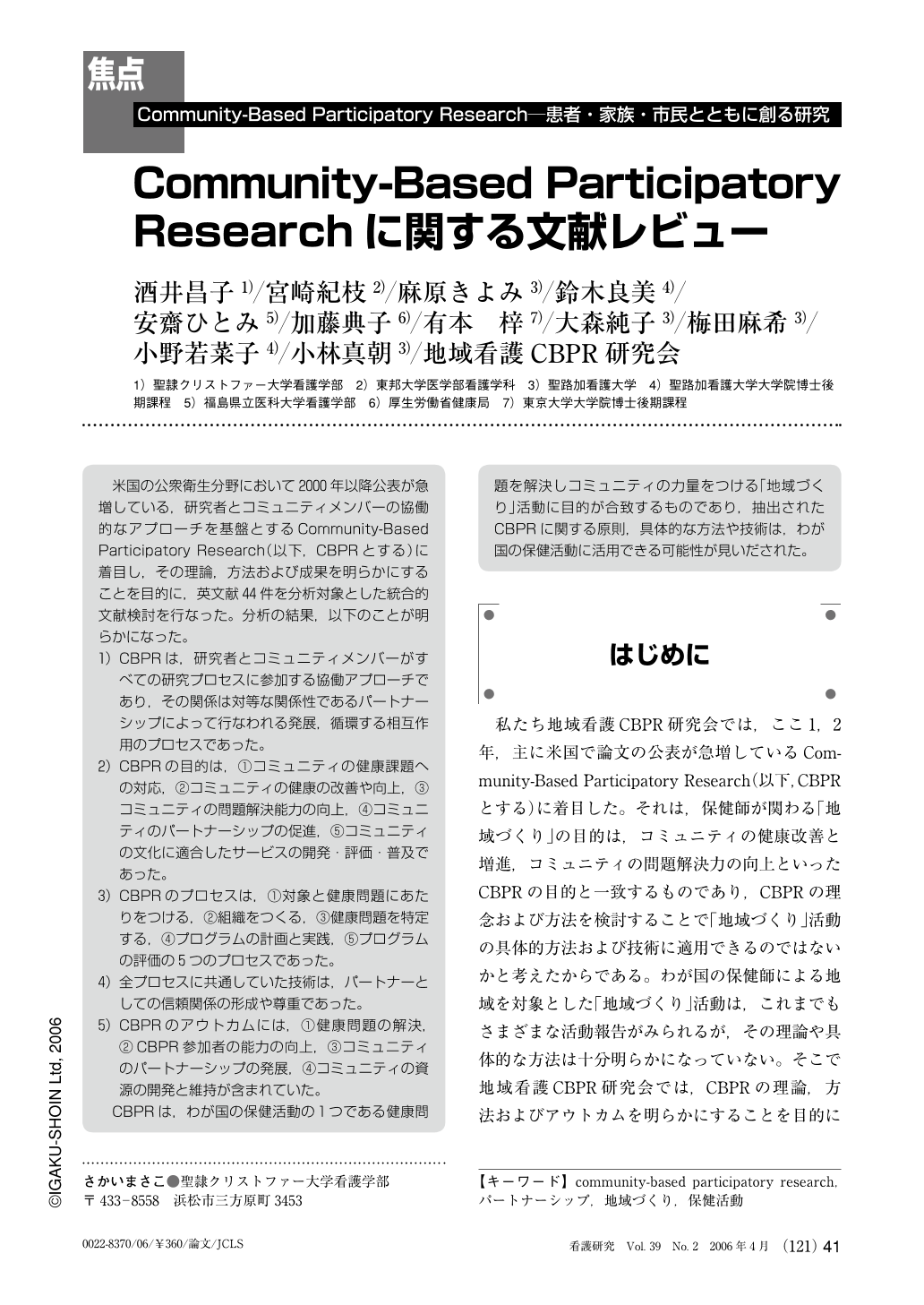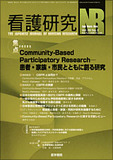Japanese
English
- 有料閲覧
- Abstract 文献概要
- 1ページ目 Look Inside
- 参考文献 Reference
- サイト内被引用 Cited by
米国の公衆衛生分野において2000年以降公表が急増している,研究者とコミュニティメンバーの協働的なアプローチを基盤とするCommunity-Based Participatory Research(以下,CBPRとする)に着目し,その理論,方法および成果を明らかにすることを目的に,英文献44件を分析対象とした統合的文献検討を行なった。分析の結果,以下のことが明らかになった。
1)CBPRは,研究者とコミュニティメンバーがすべての研究プロセスに参加する協働アプローチであり,その関係は対等な関係性であるパートナーシップによって行なわれる発展,循環する相互作用のプロセスであった。
2)CBPRの目的は,①コミュニティの健康課題への対応,②コミュニティの健康の改善や向上,③コミュニティの問題解決能力の向上,④コミュニティのパートナーシップの促進,⑤コミュニティの文化に適合したサービスの開発・評価・普及であった。
3)CBPRのプロセスは,①対象と健康問題にあたりをつける,②組織をつくる,③健康問題を特定する,④プログラムの計画と実践,⑤プログラムの評価の5つのプロセスであった。
4)全プロセスに共通していた技術は,パートナーとしての信頼関係の形成や尊重であった。
5)CBPRのアウトカムには,①健康問題の解決,②CBPR参加者の能力の向上,③コミュニティのパートナーシップの発展,④コミュニティの資源の開発と維持が含まれていた。
CBPRは,わが国の保健活動の1つである健康問題を解決しコミュニティの力量をつける「地域づくり」活動に目的が合致するものであり,抽出されたCBPRに関する原則,具体的な方法や技術は,わが国の保健活動に活用できる可能性が見いだされた。
The purpose of this paper was to identify the definitions, processes and outcomes of Community-Based Participatory Research (CBPR). For this purpose, we conducted an integrative review of the public health literature. We found 44 articles that had the term CBPR in their titles, with all of these articles being published after 2000.
The results were as follows :
1. CBPR is a collaborative partnership-approach that develops by a cyclical and reciprocal process. During this process, researchers and community members work together as equal partners.
2. The purposes of the CBPR are to : ①work on the partner-community's social determinants of health, ②improve and promote health status of the community, ③build capacity in the community, ④develop collaborative partnership in the community, and ⑤evaluate services in terms of its cultural competency, thereby leading to the development of culturally competent services.
3. The CBPR process includes : ①meeting a community that has a particular need for a CBPR project, ②formulating partnership for the CBPR project, ③identifying health issues in the community, ④planning and implementing the program, and ⑤evaluating the program and continuing dialogue with the CBPR members, who are both community members and researchers.
4. The common and basic skills observed at all steps of the process have the purpose of building respect and trust among the CBPR members.
5. The outcomes include : ①finding solutions for health needs, ②facilitating capacity building among CBPR members, ③developing collaborative partnerships in the community, and ④creating health related resources in the community.
The principles and skills that were derived from the CBPR literature are also relevant to the activities of public health nurses' activities in Japan. We therefore considered that the theories and approaches of CBPR are applicable to the activities of Japanese public health nurses.

Copyright © 2006, Igaku-Shoin Ltd. All rights reserved.


